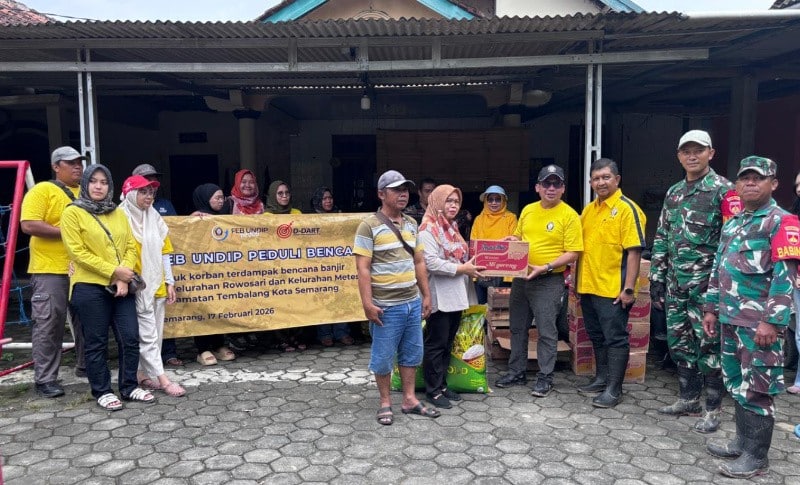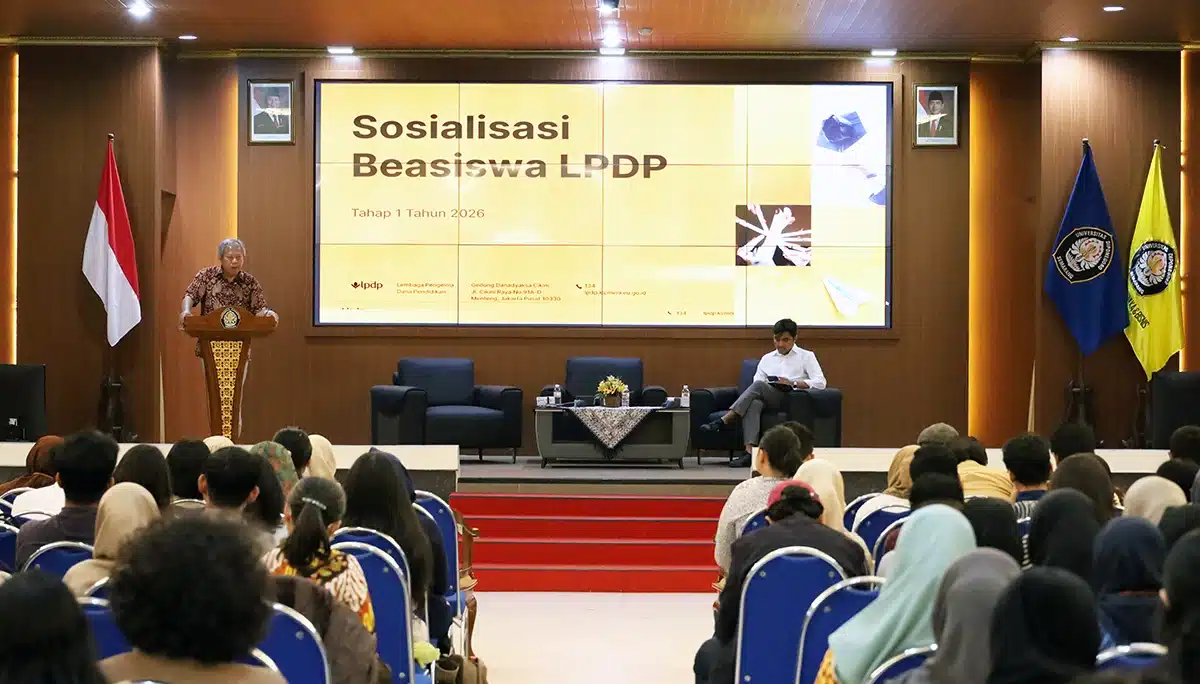UNDIP Semarang (Tuesday, 02/04). Prof. Dr. Ir. Sutrisno Anggoro, M.S., a distinguished professor of the Faculty of Fisheries and Marine Sciences (FPIK) with expertise in Water Resources, has completed his dedicated service. At the ceremony of the Open Session of the Purna Adi Cendekia Academic Ceremony held at the Prof. Soedarto, S.H. Building, Undip Tembalang Campus, he had the opportunity to deliver an oration titled “Hydrobiological Eco-Phylanthropy Approach to Achieve Sustainable Fisheries Resource Management.”
UNDIP’s Purna Adi Cendekia (Retirement Ceremony) activity is one of the annual periodic academic agendas carried out to honor the professors who have officially entered the retirement era.
During his retirement academic oration, Prof. Sutrisno explained that progress in the field of fisheries and marine sciences, whether in the fishing business or aquaculture, as well as its accompanying activities (processing and marketing), cannot be separated from the progress of the fundamental sciences. One of those branches of science is hydrobiology. Knowledge of hydrobiology is essential to stepping into the actual management of fisheries resources.
Studying hydrobiology in fisheries and marine sciences means striving to understand and master the basics of aquatic bioecology for practical fisheries purposes, whether for fishing, aquaculture, or natural resource conservation.
“Science and technology are powers that can be misused; therefore, they need to be controlled with eco-philanthropy to be in line with MEA (Moral-Ethics-Religion), which is altruistic and not egoistic. Then, fair and wise eco-philanthropy focuses on ecological welfare (animal and plant welfare and human well-being), further on the harmony and balance of environmental carrying capacity with human and biota needs,” said Prof. Sutrisno.
“As with the application of other sciences and technologies, the implementation of hydrobiological eco-philanthropy in fisheries management can have positive impacts that provide blessings and benefits, but conversely, there are deviations from eco-philanthropy practices that have negative impacts triggering disasters and harm,” he added.
“Therefore, hydrobiological eco-philanthropy plays a role in controlling and realizing sustainable fisheries management through strengthening and practicing scientific spirit in an altruistic and non-egoistic manner. In order to achieve sustainable fisheries governance, the application of hydrobiology in an eco-philanthropic manner must be integrated and synergized with other branches of science in a trans and multidisciplinary manner,” said Prof. Sutrisno. (DHW-Public Relations)
UNDIP Semarang (Tuesday, 02/04). Prof. Dr. Ir. Sutrisno Anggoro, M.S., a distinguished professor of the Faculty of Fisheries and Marine Sciences (FPIK) with expertise in Water Resources, has completed his dedicated service. At the ceremony of the Open Session of the Purna Adi Cendekia Academic Ceremony held at the Prof. Soedarto, S.H. Building, Undip Tembalang Campus, he had the opportunity to deliver an oration titled “Hydrobiological Eco-Phylanthropy Approach to Achieve Sustainable Fisheries Resource Management.”
UNDIP’s Purna Adi Cendekia (Retirement Ceremony) activity is one of the annual periodic academic agendas carried out to honor the professors who have officially entered the retirement era.
During his retirement academic oration, Prof. Sutrisno explained that progress in the field of fisheries and marine sciences, whether in the fishing business or aquaculture, as well as its accompanying activities (processing and marketing), cannot be separated from the progress of the fundamental sciences. One of those branches of science is hydrobiology. Knowledge of hydrobiology is essential to stepping into the actual management of fisheries resources.
Studying hydrobiology in fisheries and marine sciences means striving to understand and master the basics of aquatic bioecology for practical fisheries purposes, whether for fishing, aquaculture, or natural resource conservation.
“Science and technology are powers that can be misused; therefore, they need to be controlled with eco-philanthropy to be in line with MEA (Moral-Ethics-Religion), which is altruistic and not egoistic. Then, fair and wise eco-philanthropy focuses on ecological welfare (animal and plant welfare and human well-being), further on the harmony and balance of environmental carrying capacity with human and biota needs,” said Prof. Sutrisno.
“As with the application of other sciences and technologies, the implementation of hydrobiological eco-philanthropy in fisheries management can have positive impacts that provide blessings and benefits, but conversely, there are deviations from eco-philanthropy practices that have negative impacts triggering disasters and harm,” he added.
“Therefore, hydrobiological eco-philanthropy plays a role in controlling and realizing sustainable fisheries management through strengthening and practicing scientific spirit in an altruistic and non-egoistic manner. In order to achieve sustainable fisheries governance, the application of hydrobiology in an eco-philanthropic manner must be integrated and synergized with other branches of science in a trans and multidisciplinary manner,” said Prof. Sutrisno. (DHW-Public Relations)










